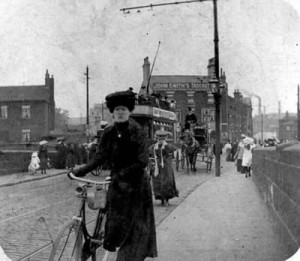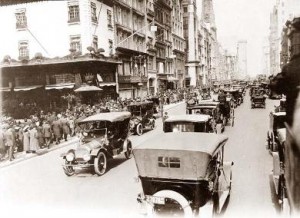London 1900: The Imperial Metropolis got me to thinking. How accurate does a historical writer have to be about the tiny details of place? Does it only matter about the major landmarks, or do the side streets count as well? How about what houses were on that street at that time exactly? Or is there no way to be perfect, because some reader will always know more about that particular place than you ever will?

I’m not thinking about clothing or household utensils or behavior or anything like that; just place. Real places, at real times.
I think about this overall issue all the time, applying it to many different aspects of my historical research and writing. Much as I love research, both the general reading and the detective work of digging out tiny details, for the most part I come down on the side of less is more.
I’m beginning to think imaginary might be more, too. In The Moonlight Mistress, two characters are driving from Germany to France. I started to check distances, and look for towns along the route, and thought how I would figure out the gasoline consumption of a 1910s model car so I know where they had to stop…and then I whapped myself in the head (mentally, and because I’m stubborn, it took several whaps). I didn’t need to do any of that, not for the type of book I was writing. Cool as it would have been, no one would have noticed and I would have fallen behind on my wordcount goals. I made up the name of a town where they stopped and bought some petrol. And to this day, no one has complained.
Sometimes, despite one’s best efforts at research, one’s best efforts at bending the story to the real setting, it’s just better to have an imaginary alley. Not totally imaginary–it will seem more real if you tie in the [small] imaginary to the [larger] real. But imaginary facts can be better and more useful at times. Why? I will give a numbered list.
1. Trying to research every inch of a certain place at a certain time can drive you demented (see above, with the whapping). If you’re writing a novel, the writing part should take precedence over the research part, because you are a fiction writer, not a researcher. It’s up to you, of course, to decide where to stop researching. I would advise doing so before you start trying to wear a microfiche viewer as a hat.
2. The information you want to find might not even exist. You could easily keep looking for ten years and then find out the only copy of the insurance map that showed the houses on that street in 1908 was ironically destroyed in a fire back in 1972. What do you do then? Besides weep, I mean.
3. Let’s be sensible, people. Really. Who’s going to check? And if they did check and complain to you twenty years later, would you care? Feel free to complain to me about my guesstimated petrol consumption in The Moonlight Mistress. I’ll wait.

4. Sometimes your imagination can get a fictional idea across in a better way than the reality. If in reality, there was a beautifully clean alley, but your story is noir, the story might be better served by a trash-strewn alley with mysterious stains. An example: I’m told for one of the cases dramatized in the series “Garrow’s Law,” Garrow is portrayed as the defender, when in real life he prosecuted that case. However, the show is about his innovations as a defense attorney.
5. Knowing too much can hamper the writing, not because it’s bad to know things, but because you can become too tangled in trying to include all of the things you know in the story. And not all of those things belong.
Finally, there’s the time issue. Certain series, for example Patrick O’Brian’s Aubrey/Maturin sea adventures, have a little too much story for history. As in, all the stuff that happens in those books? Is impossible, within the time frame when they supposedly occur. But I love those books, and I’d rather have the stories than have them be crammed into “real” time. So…I just kind of go with it. How long was that journey to Australia by sailing ship again?
#
Yesterday author Isobel Carr had a terrific post at History Hoydens about research and documentation, from a re-enactor’s pov.

I think it depends on how important it is for your story. I faced the same problem with a historical YA that I’m writing. I needed to get my character from Philadelphia to New York and then upstate in the 1890’s. And I started researching time tables etc. and then I realized that the only thing I really needed to know was that my heroine would have had to take a ferry from New Jersey to New York because there was no Penn Station in New York at that time (it opened in 1905) and no tunnel from New Jersey to New York for the train. From there, she needed to get uptown to Grand Central depot (which did exist) to take her train upstate. It wasn’t important that the reader know every single detail of the journey, but I needed to have a general idea of how she was going to get where she needed to go.
I learned that I could research this book till the cows come home. Finally I just started writing and if I needed to know something, I would either note it in the manuscript for later, or stop and look it up.
You can’t know everything but you need to know enough to give the reader a sense of the time and the place.
I make up towns, alleys and businesses freely. I need to know what kind of place was there, though, because there’s always a reason for it to be there. For example, where I live, old towns are normally set 30-35 miles apart along the old roads. There would have to be a reason for the next town to be 40 or 43 miles away. The next town *can* be that far off, but there has to be a location-specific reason as to why.
You will make stuff up. Even if you research the house that was on a real life street, down to the very furniture in the room, it still ceases to be real the moment you introduce your fictional characters. I much prefer made up places when I write because I can tailor them to my needs and no one can say it’s wrong, and I don’t mind them when I read either.
Randomly, I think Garrow’s Law switched his role in several cases (even if Ican only think of one right now) and they also stole at least one of Erskine’s cases too. But it made for good drama!
Great post, Victoria. There are definitely times when making up a place makes sense because if you use a real one you are bound to get it wrong – or it doesn’t fit the plot. Anthony Trollope invented the entire county of Barsetshire for his books. Jilly Cooper, in her contemporaries, did the same thing with – I think – Rutshire (reflecting the major preoccupation of its inhabitants). I don’t think I’ve seen an American writer invent a brand new state, but that could be interesting.
Like Elizabeth with New York, I don’t make up details of London (though I’m also not obsessive about placing an exact house in a street – just as long as it’s plausible that such a shop or style of building could have existed there). And distances and travel? They are the bane of this historical writer. Finding your characters have got to spend another night on the road can really throw a spanner in the works.
Thanks, Elizabeth, Amber, Felicia, and Miranda! It’s good to know I’m not alone.
I try and get the bigger picture right, for example if my hero and heroine are walking around London, I’ll consult my trusty A-Z of Regency London to work out where they might go and name a street or two. If they’re stopping for the night at a coaching inn, it doesn’t take long to find out the name of an original inn from the Google.
But I try not to obsess. :) It’s hard not to. I remember waking up my husband one night and telling him that my hero couldn’t eat rabbit stew in Roman Britain because rabbits came over with the Normans. He was not impressed…
I think it bugs me when something is easily available, like titles or, major buildings and someone doesn’t get those details right. I do however love it when an author adds those extra details that I didn’t know because I will go and check them out-because I’m a history nerd.
I remember waking up my husband one night and telling him that my hero couldn’t eat rabbit stew in Roman Britain because rabbits came over with the Normans.
See, I think that kind of thing is wicked cool. And that’s something you can work with to make a story more interesting.
“If they’re stopping for the night at a coaching inn, it doesn’t take long to find out the name of an original inn from the Google.”
That’s exactly when I make one up, because if I pick an existing one I’ll need to know all the details about it (like the exact layout etc) which are often much harder to find. Just so I won’t make mistakes, I’ll pick a real one, read up as much as I can find about it and make up one of my own based on it. To me there’s a difference between a mistake (like a Roman rabbit) and fictional world building (deciding that in my fictional Britain, the coaching inn in X-town is the Cock & Crown).
That’s what I tell myself, anyway. :)
Excellent topic! I too can get bogged down with minute details, and when you’re dealing with particular places (the aforementioned London and New York) or events (Titanic, WWI, etc), it’s easy to obsess because so many people are knowledgeable about those topics. However, like Felicia said, once you insert your imaginary characters into a landscape or event, you’re basically making everything up!
@Miranda: I don’t think I’ve seen an American writer invent a brand new state, but that could be interesting.
Sinclair Lewis made up the state of Winnemac. It’s not romance, but it’s one US writer who dared to insert an imaginary state into America!